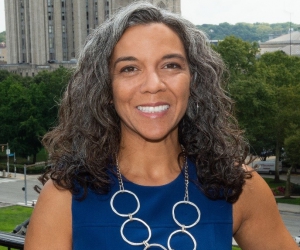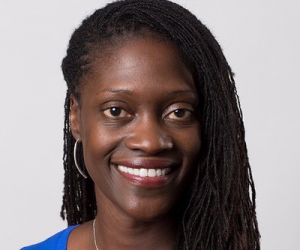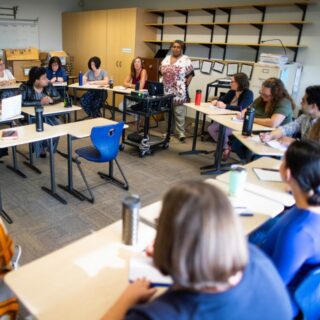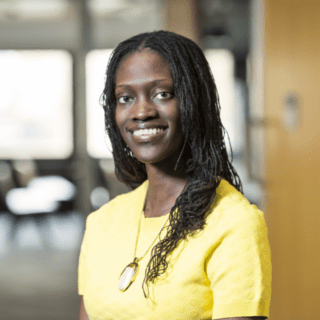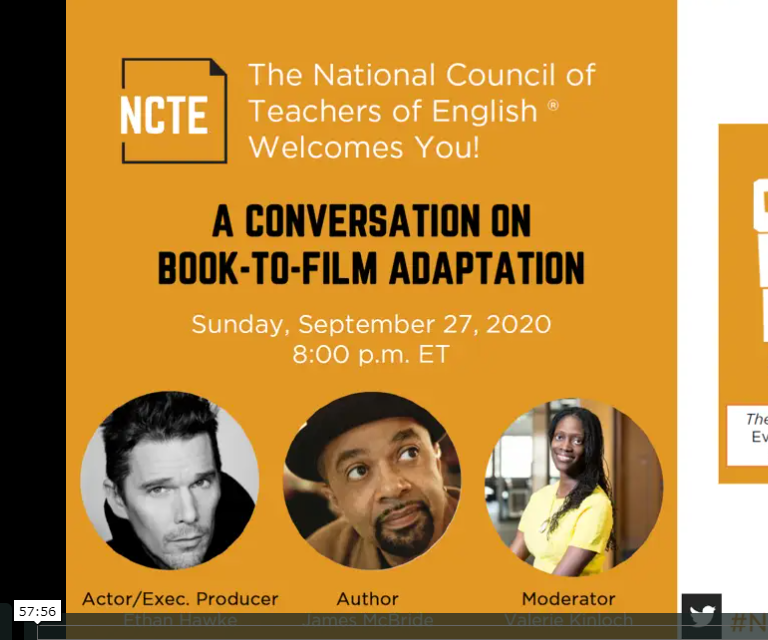
Dean Kinloch Moderates Book-to-Film Discussion on “The Good Lord Bird”
Over the years, Hollywood has adapted many books into movies and TV shows. Many have been memorable experiences that brought the characters and stories vividly to life.
The National Council of Teachers of English (NCTE) recently sponsored an online conversation about the book-to-film adaptation process that centered on the release of the new Showtime® limited series, “The Good Lord Bird.”
The series, which premiered on Showtime on Sunday, October 4, 2020 to positive reviews from critics, is an adaptation of the novel “The Good Lord Bird” by author James McBride, which received the 2013 National Book Award for Fiction.
True to McBride’s novel, the adaptation tells a story about abolitionist-crusader John Brown and his historic raid on Harpers Ferry in 1859. It is told through the perspective of the protagonist, Onion, a newly freed Black youth.
NCTE President-Elect Valerie Kinloch, the Renée and Richard Goldman Dean of the University of Pittsburgh School of Education, moderated the discussion with the show’s creator, lead actor, and executive producer Ethan Hawke and with the novel’s author and fellow show executive producer James McBride.
[Watch the full recording here]
Their hour-long discussion centered on the novel’s characters, character development, and major themes, and anti-slavery efforts in Antebellum America. The discussion also connected historical abolitionists and abolitionism to present-day efforts for racial equality, justice, freedom, and liberation for Black people.
According to Kinloch, “It brings to light things that some folks think are no longer relevant today. It brings to light issues of race and racism. It brings to light struggle, the need to think deeply about abolitionism, the need to say ‘take a stand for something because we’re all going to hell if we’re not going to stand for something…for other people and with other people.”
“This story is just as relevant today as it was when John Brown, the real person, was fighting for the freedom of Black people,” Kinloch added. “So, how have we not gotten farther than when he died in 1859?”
Many have asked Hawke, who plays Brown in the television series, what his character, if he were alive today, would think of the video of George Floyd dying in police custody or the marches associated with the Black Lives Matter movement.
“It’s incredibly sad, really,” said Hawke, who spent countless hours researching the life and times of Brown to prepare for the part.
“This is a person who really loved people, loved them body and soul, who believed in people, white people and Black people,” said Hawke.
According to Hawke, Brown was a progressive thinker who also supported the liberation of Indigenous peoples and women. He said bloodshed was a last resort for Brown, but he deemed it necessary since his contemporaries would neither listen to reason nor stand against slavery.
Hawke speculated that Brown would be dismayed by the lack of racial progress in this country over 150 years later. “I really think he would have thought that this nation would be purged by blood and then healed. And the healing has been so difficult and so slow, it’s been shocking to me,” said Hawke.
Other highlights from the conversation:
On identity and character development:
According to McBride, “your great, your good books always deal with [the] business of identity. “Good Lord Bird” has a lot to do with the business of identity.”
Hawke agreed and pointed out that “what James said about identity, this book is all about that. Is Onion a boy, is he a girl? Is he Black, is he white? Is John Brown good, is he bad? Sanity versus insanity, there’s all these things about how we judge others.”
On the importance of history and the social sciences:
McBride made it clear that “when colleges and high schools and even middle schools, when they cut back on history, rename history this and rename that, and cut back on African American history, and add computer classes, they are curtailing the future of the creative juices of this country, which makes us great.”
He continued, “when we curtail the liberal arts, history, anthropology, these subjects where you have to study how people think — philosophy, religion — we’re cutting off our ability to change.”
On the interdisciplinary nature of literature:
Hawke shared his metaphor that “these books are like windows into a bigger life. We see these tiny little keyholes that we’re looking out of. And the books, a good writer, gives us another keyhole. And our whole vision is expanded…It changes you.”
Kinloch responded that “we can’t just think about history as over here by itself or English literature over here. It’s all connected…it’s thinking about the reality that literature is history, is philosophy, is mathematics; it’s all interconnected and what we have to do is to understand the interconnectedness and then to be able to teach it and also to receive it back from our students who might know more than we do.”
On the value of teachers and educators:
“Being a teacher,” according to Hawke, “is a holy calling. My brother [a mathematics teacher in Dallas, Texas] works really hard with no payback except the joy of showing some kid an algorithm that gives him confidence that he actually can think. I would have never come to the joys of acting and the joys of my life if it weren’t for teachers.”
Hawke’s point connected to McBride’s sentiment that “creativity is rooted in the freedom to learn, the freedom to read, the freedom to know history, that’s really where freedom comes from.”
On the work of abolitionists today:
Kinloch quoted Pitt Education alumna Bettina Love, who believes “to want freedom is to welcome struggle.” Kinloch then shared with McBride and Hawke that “if we want freedom, we can’t just want it for ourselves. We’ve got to want it for each other.”
Learn More
Watch the full recording of “The Good Lord Bird,” a discussion of book-to-film adaptation by the NCTE.

